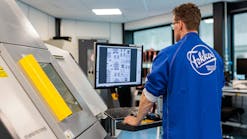Boeing’s conspicuous manufacturing woes and the resulting scrutiny from regulators, Congress and the flying public cast a shadow Friday over the company’s annual shareholder meeting.
In his opening speech, Steve Mollenkopf, independent chair of the Boeing board of directors, addressed wounds to the company’s reputation suffered since the midair blowout of a fuselage panel in January.
Mollenkopf vowed to “regain the trust lost in recent times, get back on track and become the company that we all know Boeing can and must be every day,” with the caveat that “recent events make it absolutely clear that we have much work to do.”
Even so, the chairman said, “the Boeing board remains fully confident in our future.”
The annual shareholder event comes at a critical moment for Boeing. Boeing brought commercial air travel to the masses and anchored the economy of the Seattle area for the better part of a century. But as the aerospace giant concludes perhaps the grimmest five-year run in its storied history, it’s facing intense scrutiny from Congress and the Federal Aviation Administration over its commitment to quality and willingness to listen when its workers flag manufacturing errors.
Congressional hearings in the wake of international crashes of Boeing Max 8 aircraft in 2018 and 2019 that killed nearly 350 passengers dragged Boeing for its responses to employees who had flagged manufacturing deficiencies. The hearings featured testimony from people who said they faced retaliation for relating anomalies, and evidence that workers had become reluctant to speak up because of managers’ negative responses. Those hearings concluded that prioritizing the profits that reward stockholders overshadowed Boeing’s commitment to safety.
In the aftermath of the January fuselage-panel blowout, still more congressional hearings are being held. Whistleblowers again described experiences that signaled Boeing’s refusal to take seriously internal criticism or troubling observations from employees. The deaths of two high-profile whistleblowers this year have drawn added attention to the company’s treatment of internal critics.
“A strong company listens to its people,” Dave Calhoun, the outgoing Boeing CEO, told shareholders Friday. “It listens to its critics.”
Since the January blowout, more than 70,000 of Boeing’s 170,000 workers took part in “quality stand downs” that generated tens of thousands of ideas for safety improvement, Calhoun said. Over the same span, he said the company experienced a fivefold increase in reports from employees about quality concerns.
“That signals real progress toward a robust reporting culture,” Calhoun said.
A renewed willingness to pause work over safety concerns, increased visibility into its suppliers’ practices, adding safety expertise at the board level, improved training and tooling for the manufacturing floor, and simplified instructions are other measures Boeing has taken since January to improve quality, according to Calhoun.
He called the January incident “a watershed moment for us, and a stark reminder that much more work remains.” Yet he called out the attention that less significant manufacturing mistakes have garnered since the blowout.
“Any operational event, no matter how routine, can get outsized headlines,” Calhoun said.
Boeing leaders’ remarks Friday morning trailed more bad headlines. An engine fire Thursday forced a Boeing 747-400 departing Indonesia to land almost immediately after takeoff.
The stream of troubles notwithstanding, Calhoun expressed optimism about Boeing’s future. He expects “a healthy, stable and predictable Boeing in the 2025-2026 time frame,” which is when Calhoun predicted shareholders can expect to see dividend checks again.
In the meantime, Calhoun said he anticipates the commercial side of Boeing’s business will stabilize because demand for its products remains high and its supply chain is becoming more synchronized. “We believe our defense business will be well on its way to historical levels,” Calhoun added.
Stockholders elected Calhoun to the company’s board Friday amid some outcry from activist investors calling for his immediate removal and questioning his compensation in light of the company’s high-profile manufacturing struggles.
“Our CEO was paid $33 million last year for failure,” stockholder James McRitchie of California, who offered one of the five shareholder proposals at the annual meeting, all of which failed. They sought a range of changes, including stronger commitments to combating climate change, public disclosure of racial and gender pay gaps, and a study about the risks associated with the company’s espoused commitment to diversity, equity and inclusion.
Calhoun, who was named Boeing’s CEO in 2020, announced in March that he plans to step down at the end of this year. The board chair Mollenkopf told investors that a subcommittee was established to find Calhoun’s successor. It has been informed by comments from advisers and stakeholders, including from stockholders and customers.
“We’re confident that we’re going to find the right person to lead this company,” Mollenkopf said.
While he’s still CEO, Calhoun said he remains focused on improving the safety of Boeing’s aircraft. “We will measure our progress one airplane at a time,” he said.
©2024 The Seattle Times. Visit seattletimes.com. Distributed by Tribune Content Agency, LLC.





